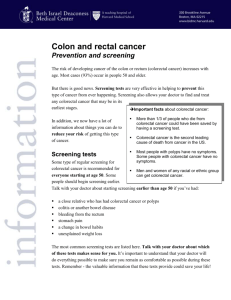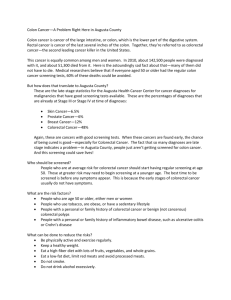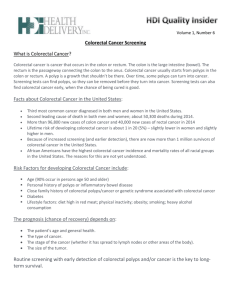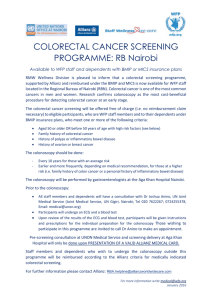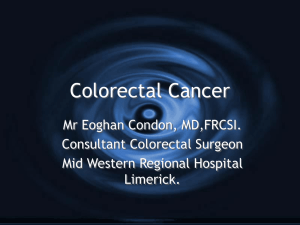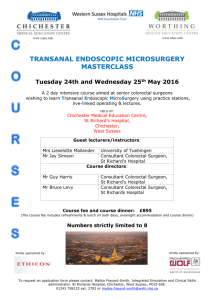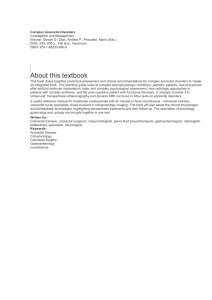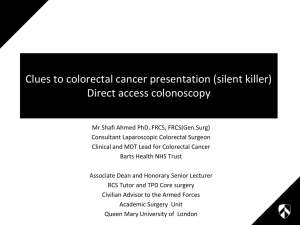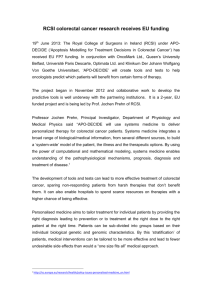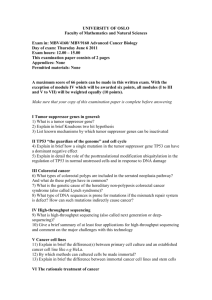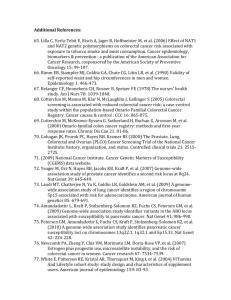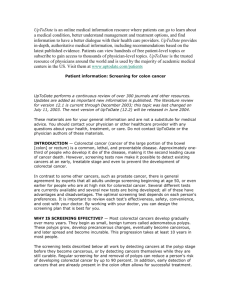Colorectal Cancer - Appleton Christian Church
advertisement
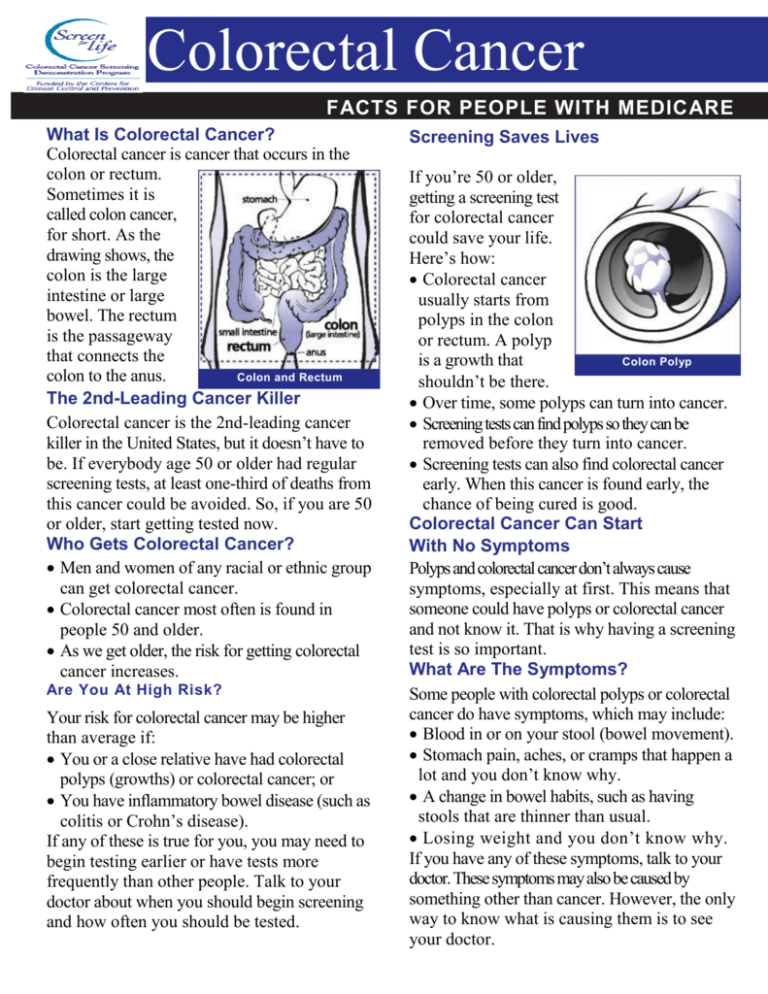
Colorectal Cancer FACTS FOR PEOPLE WITH MEDICARE What Is Colorectal Cancer? Colorectal cancer is cancer that occurs in the colon or rectum. Sometimes it is called colon cancer, for short. As the drawing shows, the colon is the large intestine or large bowel. The rectum is the passageway that connects the colon to the anus. Colon and Rectum The 2nd-Leading Cancer Killer Colorectal cancer is the 2nd-leading cancer killer in the United States, but it doesn’t have to be. If everybody age 50 or older had regular screening tests, at least one-third of deaths from this cancer could be avoided. So, if you are 50 or older, start getting tested now. Who Gets Colorectal Cancer? Men and women of any racial or ethnic group can get colorectal cancer. Colorectal cancer most often is found in people 50 and older. As we get older, the risk for getting colorectal cancer increases. Are You At High Risk? Your risk for colorectal cancer may be higher than average if: You or a close relative have had colorectal polyps (growths) or colorectal cancer; or You have inflammatory bowel disease (such as colitis or Crohn’s disease). If any of these is true for you, you may need to begin testing earlier or have tests more frequently than other people. Talk to your doctor about when you should begin screening and how often you should be tested. Screening Saves Lives If you’re 50 or older, getting a screening test for colorectal cancer could save your life. Here’s how: Colorectal cancer usually starts from polyps in the colon or rectum. A polyp is a growth that Colon Polyp shouldn’t be there. Over time, some polyps can turn into cancer. Screening tests can find polyps so they can be removed before they turn into cancer. Screening tests can also find colorectal cancer early. When this cancer is found early, the chance of being cured is good. Colorectal Cancer Can Start With No Symptoms Polyps and colorectal cancer don’t always cause symptoms, especially at first. This means that someone could have polyps or colorectal cancer and not know it. That is why having a screening test is so important. What Are The Symptoms? Some people with colorectal polyps or colorectal cancer do have symptoms, which may include: Blood in or on your stool (bowel movement). Stomach pain, aches, or cramps that happen a lot and you don’t know why. A change in bowel habits, such as having stools that are thinner than usual. Losing weight and you don’t know why. If you have any of these symptoms, talk to your doctor. These symptoms may also be caused by something other than cancer. However, the only way to know what is causing them is to see your doctor. Screening Tests and Medicare Coverage Several tests can be used to detect polyps or colorectal cancer. Each can be used alone. Sometimes they are used in combination with each other. People age 50 or older with Medicare are eligible for colorectal cancer screening. There is no age limit for colonoscopy. Fecal Occult Blood Test or Stool Test —You Barium Enema — You are given an enema receive a test kit from your doctor or other with a liquid called barium. Then the doctor health care provider. At home, you put a small takes an x-ray. The barium allows the doctor stool sample on a test card. You do this for to see the outline of your colon on the x-ray three bowel movements in a row. Then you to check for polyps or anything else that needs return the test cards to the doctor or a lab. to be checked. The stool samples are checked for blood. Medicare: Your doctor may order this test Medicare: Covers once a year. You pay nothing. as a substitute for flexible sigmoidoscopy or colonoscopy. It is covered every 4 years if you Flexible Sigmoidoscopy — The doctor puts are not at high risk or covered every 2 years if a short, thin, flexible, lighted tube into your you are at high risk for colorectal cancer. You rectum. The doctor checks for polyps or cancer pay 20% of approved amount after the yearly inside the rectum and lower third of the colon. Part B deductible. Medicare: Covers every 4 years. You pay 20% of approved amount after Part B deductible.* * Ifflexible sigmoidoscopy or colonoscopy is done Fecal Occult Blood Test Plus Flexible in an ambulatory surgical center or hospital Sigmoidoscopy — Your doctor may ask you outpatient department, you pay 25% of to have both tests. Some experts believe that Medicare approved amount.. by using both, there is a better chance of finding polyps or colorectal cancer. Medicare: See above. More Information Colonoscopy — This is similar to flexible For more information about Medicare sigmoidoscopy, except the doctor uses a longer coverage, call 1-800-MEDICARE tube to check for polyps or cancer inside the (1-800-633-4227). TTY users should call rectum and the entire colon. During the test, 1-877-486-2048. Or visit www.medicare.gov. the doctor can find and remove most polyps and some cancers. You will be given For more information about colorectal cancer medication to help you relax and are advised and screening, visit not to drive or work on the day of the exam. www.cdc.gov/screenforlife or call CDC Info at 1-800-CDC-INFO (1-800-232-4636). Medicare: Covers every 10 years if you are For TTY, call 1-888-232-6348. not at high risk for colorectal cancer, but not within 4 years of having screening flexible sigmoidoscopy. Covers every 2 years if you are at SAFER • HEALThiER • PEo LE high risk. There is no age limit for colonoscopy. You pay 20% of Medicare approved amount after yearly Part B deductible.* Colonoscopy also may be used as a follow-up test fi anything unusual is found during one of the other TM screening tests. Medicare covers follow-up colonoscopy. p TM CDC Publication #99-6949 CMS Publication #11040 Rev. January 2006
